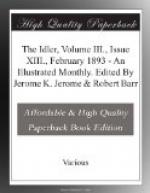[Illustration: “CROSSED THE GAP HAND OVER HAND.”]
After the long strain of the desperate but futile attack made by the Russians on Plevna in the early part of the September of the war, I fell a victim to the malarial fever of the Lower Danube, and had to be invalided back to Bucharest. The illness grew upon me, and my condition became very serious. Worthy Andreas nursed me with great tenderness and assiduity in the lodgings to which I had been brought, since they would not accept a fever patient at Brofft’s. After some days of wretchedness I became delirious, and, of course, lost consciousness; my last recollection was of Andreas wetting my parched lips with lemonade. When I recovered my senses, and looked out feebly, there was nobody in the room. How long I had been unconscious I had no idea. I lay there in a half stupor till evening, unable from weakness to summon any assistance. In the dusk came the English doctor who had been attending me. “Where is Andreas?” he asked. I could not tell him. “He was here last night,” he said; “you have been delirious for seven days.” The woman of the house was summoned. She had not seen Andreas since the previous night, but, busy about her own domestic affairs, had no suspicion until she entered the room that Andreas was not with me still.
Andreas never returned. It appeared that he had taken away all his belongings. One day, when gradually mending, I put my hand under the pillow with intent to find my watch, which was an heirloom, and wind it up. I could find no watch. No more could I find the bag of ducats which was alongside the watch before I lost my senses. Search was made throughout the room without success, and, with whatever reluctance to believe a thing so utterly unlikely, I could not refrain from the conviction that Andreas must have carried off both money and watch. The thought caused a relapse, but at length I attained convalescence, and was able to drive out. But the doctor was firm that during the now imminent winter I was not to return to the field. Fortunately, my able colleagues, MacGahan and Millet, were there; and I was therefore the less distressed by Dr. ——’s peremptory sentence on me. I was condemned to return to England as soon as I should be strong enough to travel.




